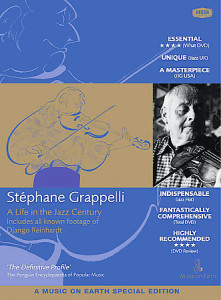 Stephane Grappelli was one of the most influential musicians of the 20th century, and one of the most loved. This sterling film project shows why.
Stephane Grappelli was one of the most influential musicians of the 20th century, and one of the most loved. This sterling film project shows why.
Grappelli was born in 1908 in the village of Montmartre, now a section of Paris. By his mid-teens, he was a professional musician, and he never stopped making music. He was largely self-taught, and although his main instrument was the violin, he was also proficient at piano and saxophone, and possibly other instruments. But it’s as a jazz fiddler that he’s best known.
And although he made music for 77 years, he’s best remembered for the seven years or so in which he and the great Gypsy guitarist Django Reinhardt rewrote the book on jazz with the Quintet of the Hot Club of France. But he was active in music from the 1920s into the 1990s, keeping alive the traditions of acoustic swing music, also known as hot jazz. And beginning in the late 1970s with a folk festival in England, he finally stepped into the international limelight he so richly deserved, and spent the last two decades of his life touring the world.
His life was incredibly well documented in photographs and film as well as recordings, and the team behind this film, led by director Paul Balmer, made good use of archival material from all phases of Grappelli’s life.
You’d never know that this film was made on a shoestring, but it was. Balmer, who had once met Grappelli when working at a U.K. radio station, set out in the early ’90s to produce a television film on the fiddler’s life. He spent several days in Paris which was made possible with cobbled-together funding, interviewing Grappelli and gathering external shots, and as a first step produced a radio program for the BBC, which was immensely popular and won several awards. But Grappelli died before Balmer could get together the money to complete the film project, and it languished for a few years, until the advent of digital filmmaking techniques and the possibilities of the DVD format gave the project new life.
The team spent far more time searching archives and getting permission to use old footage, recordings and photographs than they did actually filming. Their thoroughness pays off in a big way for the viewers, the fans, and history. In addition to the two-hour main feature on one disc, a second disc contains seven unedited film clips from various stages of Grappelli’s life, 11 “chapters” that were not included in the final cut of the film, the director’s chronicle of the making of the film, a photo montage of stills out of Grappelli’s collection, and more. The DVD purportedly contains all known film footage of Reinhardt, including a newly restored seven-minute clip of the Quintet.
In addition to many clips of Balmer’s interviews with the aged Grappelli, we see and hear him making music with the likes of Yehudi Menuhin, George Shearing, Duke Ellington and others. Many other figures from his life contribute interviews, and rare clips of Art Tatum, Joe Venuti and Eddie Lang, and Gregor and the Gregoriens are included.
The film itself concentrates almost exclusively on Grappelli’s life as a musician, with very little intrusion on his private life. One of the bonus chapters discloses that, although he never married, he had a daughter — we see stills of her as a girl as Grappelli plays “Evelyn,” the tune he dedicated to her, and a televised reunion he had with her and two grandsons on the “This Was Your Life” TV show.
But mostly, this film is about the music. Grappelli’s face smiling sweetly as he runs off astonishing series of notes, or stretches out the notes of a languid ballad. He was a master of improvisation, one of those musicians who seem to not so much play music as channel it from somewhere out there in the universe, where everything is beautiful and free and sensual, and the entire range of human emotion can be expressed in the sublime tones of a vibrating string stretched across a curved piece of wood.
Stephane Grappelli: A Life In The Jazz Century is a masterpiece of the art of film biography, a worthy tribute to a man who brought so much joy into the world through his music. It’s absolutely essential to the film library of any music lover.
(Music on Earth, 2002)
